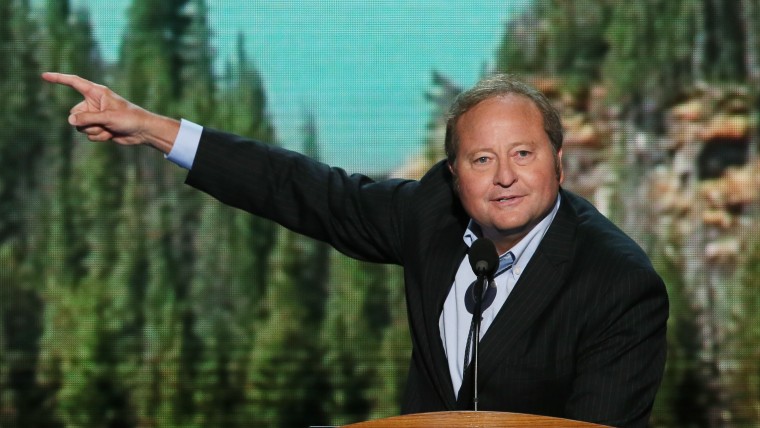It's hardly a secret that a variety of political figures have presidential ambitions and are taking steps now to position themselves for 2016 candidacies. Some are proving to be more graceful than others.
Take former Montana Gov. Brian Schweitzer (D), for example.
Schweitzer, an MSNBC contributor, initially expressed an interest in running for the U.S. Senate this year, to the delight of his Democratic allies. He then
changed his mind without explanation, and soon after started dropping 2016 hints.
This led him, among other things, to show up at Mitt Romney's summit in Utah over the weekend,
expressing apparent disappointment that Romney lost in 2012. "I don't know why you lost the election, Mitt, but I know this: I was watching you on TV and I didn't see the Mitt Romney that I knew," Schweitzer said. "You are a fun guy and you're easy-going and Obama is not. I've been in the room with him a little, too. He's stiff as a board and you've got it going on."
So, Schweitzer is one of those Democrats who thinks Romney is more fun and engaging than President Obama. I see. For someone who may soon be trying to appeal to Democratic primary voters, it seemed like a curious thing to say.
This was the week that Sen. Dianne Feinstein took to the Senate floor to accuse the CIA of spying on congressional staffers investigating the agency's treatment of terrorism suspects under the Bush administration. Schweitzer is incredulous that Feinstein -- considered by her critics to be too close to the intelligence community -- was now criticizing the agency. "She was the woman who was standing under the streetlight with her dress pulled all the way up over her knees, and now she says, 'I'm a nun,' when it comes to this spying!" he says. Then, he adds, quickly, "I mean, maybe that's the wrong metaphor -- but she was all in!"
Note to all future candidates: if your conscience is telling you, "That's the wrong metaphor," it's wise to take that seriously.
Wait, it gets a little worse.
It wasn't the only time Schweitzer was unable to hold his tongue. Last week, I called him on the night Majority Leader Eric Cantor was defeated in his GOP primary. "Don't hold this against me, but I'm going to blurt it out. How do I say this ... men in the South, they are a little effeminate," he offered when I mentioned the stunning news. When I asked him what he meant, he added, "They just have effeminate mannerisms. If you were just a regular person, you turned on the TV, and you saw Eric Cantor talking, I would say -- and I'm fine with gay people, that's all right -- but my gaydar is 60-70 percent. But he's not, I think, so I don't know. Again, I couldn't care less. I'm accepting."
There is, of course, a Seinfeld "not that there's anything wrong with that" joke waiting in the wings.
I realize that Schweitzer has his admirers in progressive politics, and the former governor's unique style strikes some as a breath of fresh air. There's very little "traditional" or "establishment" about this guy.
But I also think it's fair to say this week's reporting offers a reminder that Schweitzer's odds of becoming a major-party presidential nominee are probably very poor.
Update: The former governor issued
a brief statement on Facebook today, responding to the reports about his comments. “I recently made a number of stupid and insensitive remarks to a reporter from the National Journal. I am deeply sorry and sincerely apologize for my carelessness and disregard," Schweitzer wrote.
